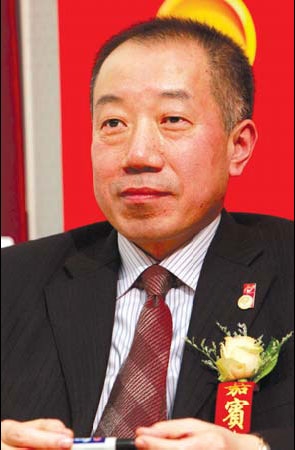Top News
2020 vision
Updated: 2010-12-31 10:11
By Andrew Moody (China Daily European Weekly)
|
 Harry Tan, chairman and chief executive officer of Days Inn China, plans to have 300 hotels by the next decade. Provided to China Daily |
"This has been hastened by the financial crisis in the West. I think this will be a very important moment, both materially and also symbolically. America has been the biggest economy in the world since before 1914."
Duncan Innes-Ker, senior economist in Beijing for the Economist Intelligence Unit, believes China's juggernaut economy will slow during the next decade from near double-digit growth today to 5.6 percent by 2020.
"I think this is because China's working population will begin to fall around the middle of the decade. This need not be the start of an immediate crisis but there will have to be major improvements in productivity to return to the sort of growth rates we have now," he says.
He does not believe China will experience the same sort of sluggish economy Japan has had over the past two decades.
"I don't think we will see anything like the Japan scenario. Japan hit the ceiling when incomes there had caught up with the developed world. If you look at per capita consumption of steel in China, it is a million miles away from where Japan was at its peak."
Innes-Ker adds if China's growth does slow, it will not be felt by China's growing middle class.
"If by 2020, the population is getting wealthier by 5 percent on an income of $20,000 a year, it will still feel a lot better off than if it was benefiting from 8 percent growth on $7,000 a year," he says.

Author Martin Jacques. Liu Zhe / China Daily |
Many fear inflation could be a feature of the next decade. China's inflation hit a 28-month high in November of 5.1 percent, fueled by rising food prices.
China's central bank raised interest rates by 0.25 percentage points to 5.56 percent in October, the first hike in nearly three years, to cool an ongoing property boom.
Michael Spencer, Asia Pacific chief economist for Deutsche Bank in Hong Kong, does not believe inflation is a major risk, however.
"I don't think we have to worry that inflation is going to take off. China is still in my view a vastly labor surplus economy. Objectively, monetary policy is too loose but I think when you are a million miles away from full employment, deflation is always going to be a great risk," he says
"I think an inflation rate of 3 to 3.5 per cent, which the central bank will be comfortable with, is probably the most likely in the next few years."
Spencer believes economic growth in China will continue at 8 or 9 percent throughout the decade and the economy will soon become bigger than that of the United States.
"It will certainly be very close, if China does not exceed the United States over the next 10 years," he says.
Although Spencer says the economy has made major advances since reform and opening-up began just over 30 years ago, people underestimate how far the economy still has to go.
"Thirty years ago China was extremely poor and produced almost nothing of value. There have been dramatic changes but really you still only have 40 percent of the workforce gainfully employed," he says.
"If you took the China labor force and equipped it with the same kind of capital as a typical European worker, they would be able to produce eight times what they currently produce."
Spencer believes it will take not just a decade but 40 years for China to fully catch up with Europe and the United States and for its citizens to enjoy the same kind of standard of living.
"I think by the time we get up to 2050, China's per capita GDP will begin to match that of the United States," he says.
|
 Wu Changqi, professor of strategic management at Guanghua School of Management at Peking University. Provided to China Daily |
Wu Changhua, Greater China director of The Climate Group in Beijing, a non-profit organization dedicated to advancing business and government leadership on climate change, believes it will give China the opportunity to fashion futuristic cities, which can be carbon neutral and make use of all the latest environmental technology.
"China is in a different position from the United States when it developed in the 19th and 20th centuries. Climate change and carbon emissions were not issues then and you put steel factories right in the center of cities," she says.
Many of the key business and retail opportunities over the next 10 years for Chinese and Western companies are likely to come in the newly enriched third- and fourth-tier cities, which will be the beneficiaries of the urbanization process.
Harry Tan is chairman and chief executive officer of Days Inn China, based in Beijing, which holds the master franchise for the US hotel chain in China.
After opening its first hotel in Changchun in Jilin province in 2004, it now has 30 and plans to have 300 by 2020, many in third- and fourth-tier cities.
"It is a major part of our strategy to target third- and fourth-tier cities. With the building of major highways, logistics are no longer a problem. It is often difficult to establish the first one in these areas but our aim is to build up a critical mass, " he says.

Michael Spencer, Asia-Pacific chief economist for Deutsche Bank in Hong Kong. Provided to China Daily |
"You might only be able to charge 200 yuan (23 euros) a night, compared to 1,000 yuan in first-tier cities but the land prices are cheaper so the cost of development is lower."
The next decade could also be the one in which Chinese brands begin to make their mark on global consciousness.
China already had seven of the top 100 most valuable global brands in 2010, according to the Brandz survey produced by international market research and consulting company Millward Brown.
Its top two brands, China Mobile in eighth position with a brand value of $52.6 billion (40 billion euros) and ICBC, the banking group, in 11th place, valued at $43.9 billion, purely serve the domestic market.
E-paper

Ear We Go
China and the world set to embrace the merciful, peaceful year of rabbit
Preview of the coming issue
Carrefour finds the going tough in China
Maid to Order
Specials

Mysteries written in blood
Historical records and Caucasian features of locals suggest link with Roman Empire.

Winning Charm
Coastal Yantai banks on little things that matter to grow

New rules to hit property market
The State Council launched a new round of measures to rein in property prices.
